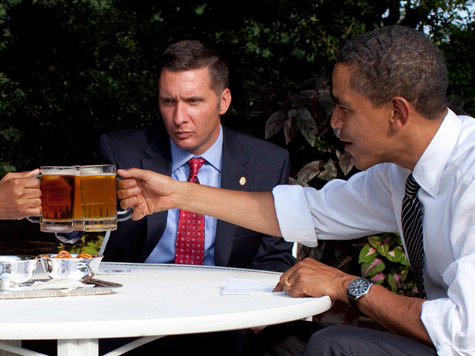In his remarks Wednesday on the non-indictment of the New York police officer who allegedly choked Eric Garner to death during a routine arrest, President Barack Obama claimed that he does not involve himself in such controversies. “My tradition is not to remark on cases where there may still be an investigation,” he said.
The opposite is true: from Skip Gates to Trayvon Martin to Michael Brown, Obama nearly always weighs in.
Even more bizarre was the fact that Obama upstaged New York City Mayor Bill de Blasio. The news networks had all been awaiting the mayor’s press conference at 4:45 p.m. ET. Yet Obama broke in with his own remarks at about 4:43 p.m., interrupting his own pre-scheduled address to a gathering of Native American leaders at the White House to offer his take on the grand jury decision before local officials had their chance to react.
There was no particular urgency to hear the president speak. In contrast, it was important to hear the mayor speak, given the possibility of violence on the streets of New York.
With activists threatening to attack the Christmas tree lighting at the Rockefeller Center Wednesday evening, and demonstrators massing in Times Square, the mayor’s message of non-violent protest was urgent. Yet Obama insisted on upstaging de Blasio.
Obama’s goal was to connect a local controversy to “the larger issues that we’ve been talking about now for the last week, the last month, the last year, and, sadly, for decades–and that is the concern on the part of too many minority communities that law enforcement is not working with them and dealing with them in a fair way.” Just over an hour later, on MSNBC Al Sharpton announced a Dec. 13 march in Washington along the same lines.
However, it is not clear, based on the available evidence, that there is much of a connection between the Garner case and earlier controversies.
For one thing, Garner is a more sympathetic victim than either Martin or Brown: though he did not obey officers, he did not use violence in any way. Furthermore, there is no evidence of racism in any of these cases–though Obama, Sharpton, and others are implying that race is the common denominator.
Some conservatives, notably my colleague John Nolte, have expressed solidarity with the protests in New York over Garner’s death. In addition to shared horror at the video of the confrontation, some conservatives have also felt genuine outrage at the fact that police were trying to enforce a tax on cigarettes, and concern about the apparent use of excessive force.
A similar moment of left-right unity had occurred in the early days of Ferguson, as libertarians joined liberals in shared criticism of the apparent “militarization” of police forces nationwide.
Yet this harmony, too, will not last, because the measures that Obama is proposing and that Sharpton, et al. are demanding involve more intrusion by the federal government, not less. Their primary concern is not abuse of power, but imposing collective guilt for what de Blasio, in his (delayed) remarks, called “centuries of racism.”
And, already, the media’s leftists are grinding the political axe, with CNN’s Jeffrey Toobin blaming the grand jury decision on the fact that Staten Island is more conservative than the rest of the city–never mind that there was no evidence of the multi-racial jury’s political affiliations.
Obama wants a debate about race and politics, not about law or policing. It is a useful distraction from the lame-duck Obama presidency’s continued failures.
It is also a debate calculated to divide Americans anew.
In 2009, after Obama accused a Cambridge policeman of acting “stupidly” in arresting Professor Gates, the result was a “beer summit” that involved both officer and arrestee. By now, Obama is no longer even bothering with gestures of reconciliation. He pointedly excluded any members of the Ferguson law enforcement community from his White House meetings on the issue this week.
What is worst is that deep down, Obama knows the truth. He cannot quite bring himself to say that America’s police actually target black people on purpose, so he refers instead to perceptions in minority communities. He seems desperate to be seen by those communities as an effective leader, instead of as the disappointment he has come to be.
So he fans the flames, regardless of the damage, seizing the spotlight as power slips from his grasp.
Senior Editor-at-Large Joel B. Pollak edits Breitbart California and is the author of the new ebook, Wacko Birds: The Fall (and Rise) of the Tea Party, available for Amazon Kindle.
Follow Joel on Twitter: @joelpollak

COMMENTS
Please let us know if you're having issues with commenting.